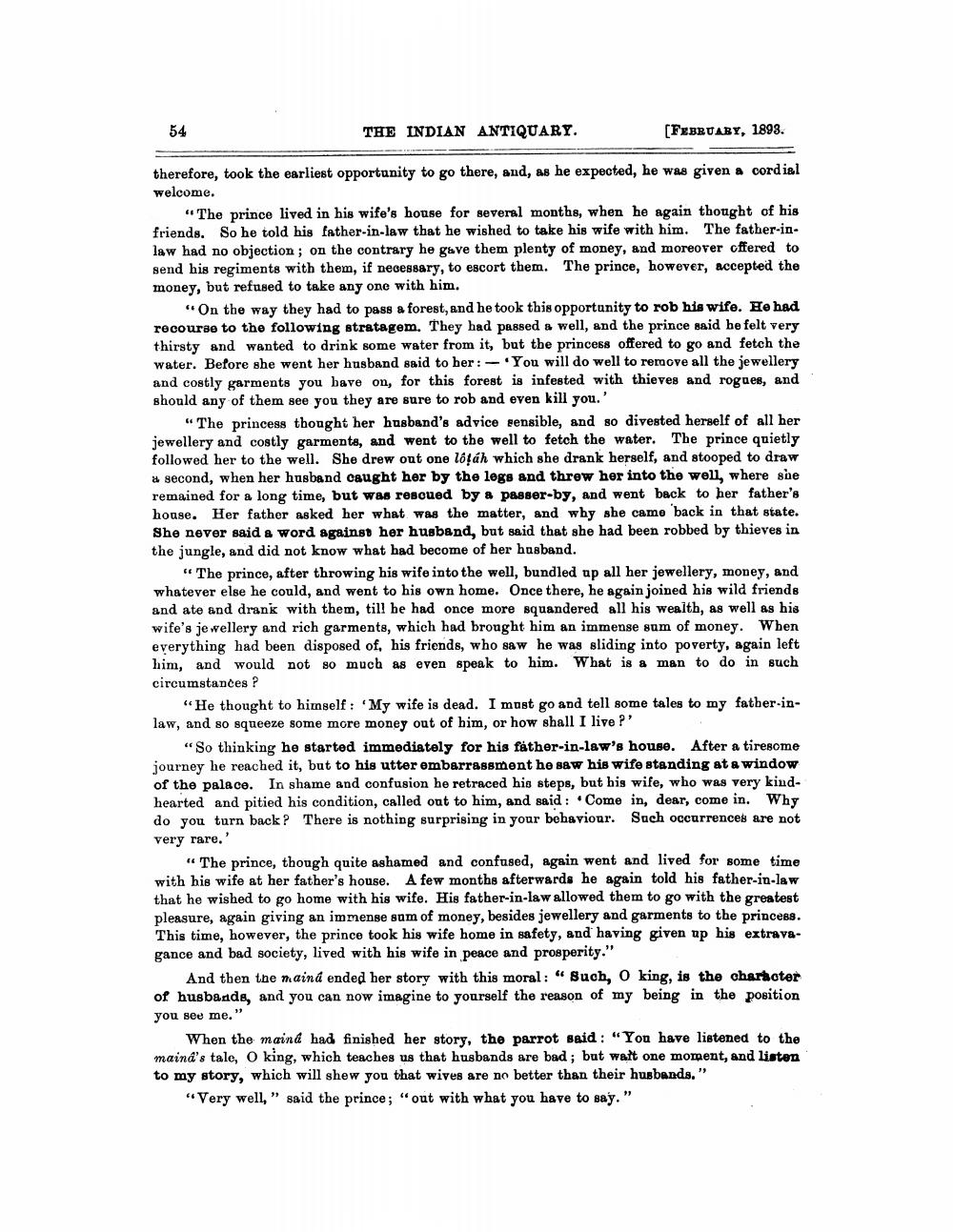________________
54
THE INDIAN ANTIQUARY.
[FEBRUARY, 1898.
therefore, took the earliest opportunity to go there, and, as he expected, he was given a cordial welcome.
"The prince lived in his wife's house for several months, when he again thought of his friends. So he told his father-in-law that he wished to take his wife with him. The father-inlaw had no objection; on the contrary he gave them plenty of money, and moreover offered to send his regiments with them, if necessary, to escort them. The prince, however, accepted the money, but refused to take any one with him.
"On the way they had to pass a forest, and he took this opportunity to rob his wife. He had recourse to the following stratagem. They had passed & well, and the prince said he felt very thirsty and wanted to drink some water from it, but the princess offered to go and fetch the water. Before she went her husband said to her:- 'You will do well to remove all the jewellery and costly garments you have on, for this forest is infested with thieves and rogues, and should any of them see you they are sure to rob and even kill you.'
"The princess thought her husband's advice sensible, and so divested herself of all her jewellery and costly garments, and went to the well to fetch the water. The prince quietly followed her to the well. She drew ont one loláh which she drank herself, and stooped to draw a second, when her husband caught her by the legs and threw her into the well, where she remained for a long time, but was rescued by & passer-by, and went back to her father's house. Her father asked her what was the matter, and why she came back in that state. She never said a word against her husband, but said that she had been robbed by thieves in the jungle, and did not know what had become of her husband
"The prince, after throwing his wife into the well, bundled up all her jewellery, money, and whatever else he could, and went to his own home. Once there, he again joined his wild friends and ate and drank with them, till be had once more squandered all his wealth, as well as his wife's jewellery and rich garments, which had brought him an immense sum of money. When everything had been disposed of, his friends, who saw he was sliding into poverty, again left him, and would not so much as even speak to him. What is a man to do in such circumstances ?
"He thought to himself: 'My wife is dead. I most go and tell some tales to my father-inlaw, and so squeeze some more money out of him, or how shall I live?'
“So thinking he started immediately for his father-in-law's house. After a tiresome journey he reached it, but to his utter embarrassment he saw his wife standing at a window of the palace. In shame and confusion he retraced his steps, but his wife, who was very kindhearted and pitied his condition, called out to him, and said : Come in, dear, come in. Why do you turn back? There is nothing surprising in your behaviour. Such occurrences are not very rare.'
"The prince, though quite ashamed and confused, again went and lived for some time with his wife at her father's house. A few months afterwards he again told his father-in-law that he wished to go home with his wife. His father-in-law allowed them to go with the greatest pleasure, again giving an immense sum of money, besides jewellery and garments to the princess. This time, however, the prince took his wife home in safety, and having given up his extravagance and bad society, lived with his wife in peace and prosperity."
And then the maind ended her story with this moral: "Such, o king, is the character of husbands, and you can now imagine to yourself the reason of my being in the position you see me."
When the maind had finished her story, the parrot said: "You have listened to the maind's talo, o king, which teaches us that husbands are bad; but wait one moment, and listen to my story, which will shew you that wives are no better than their husbands."
"Very well,” said the prince; "out with what you have to say."




